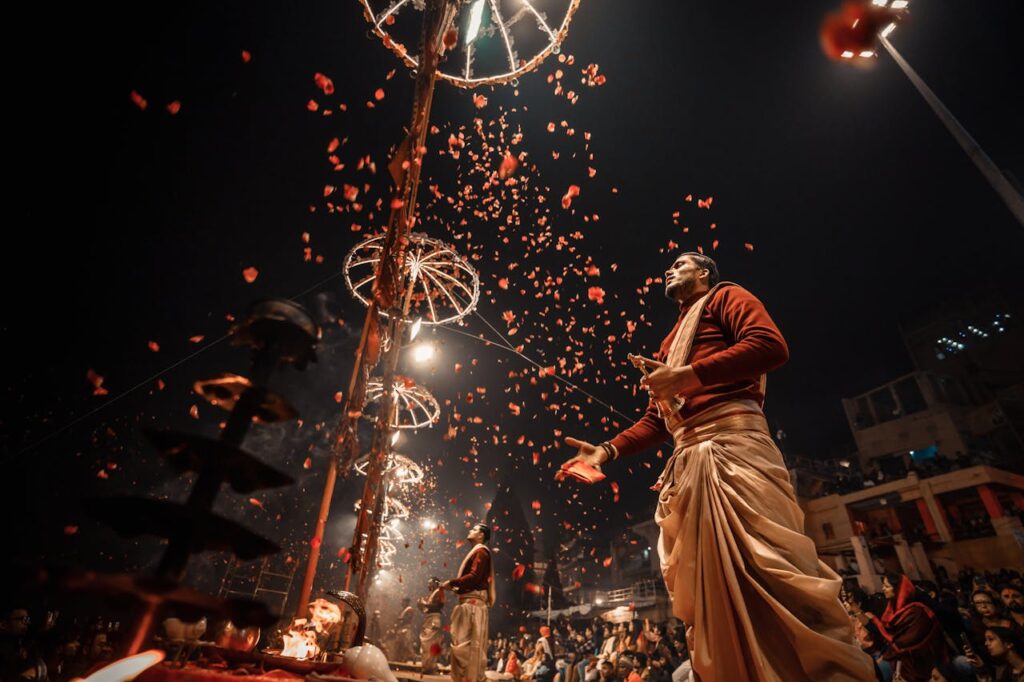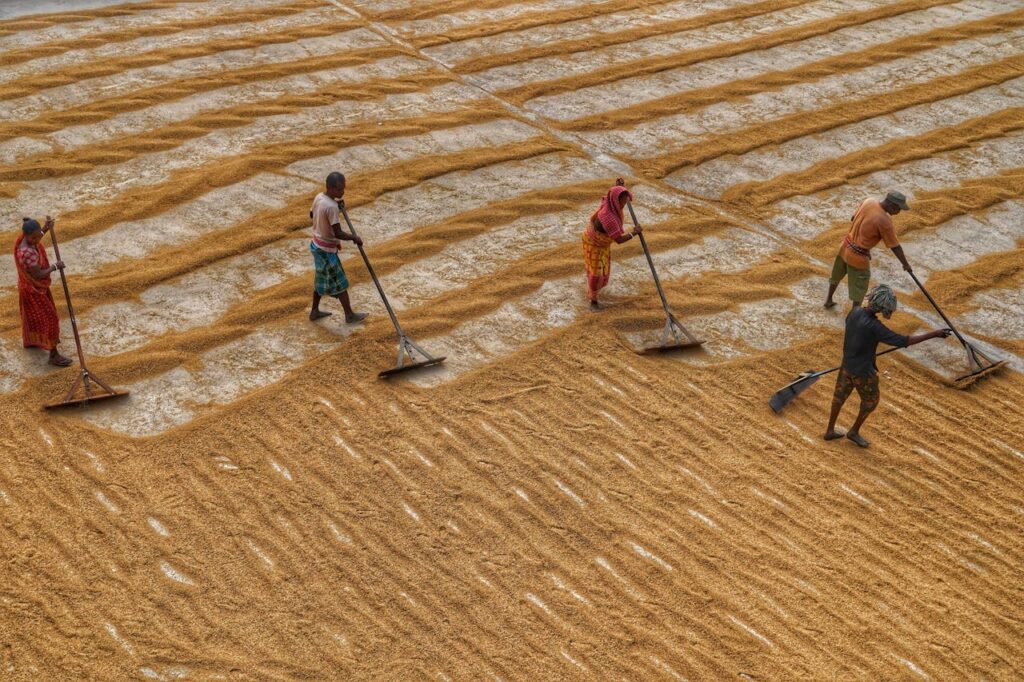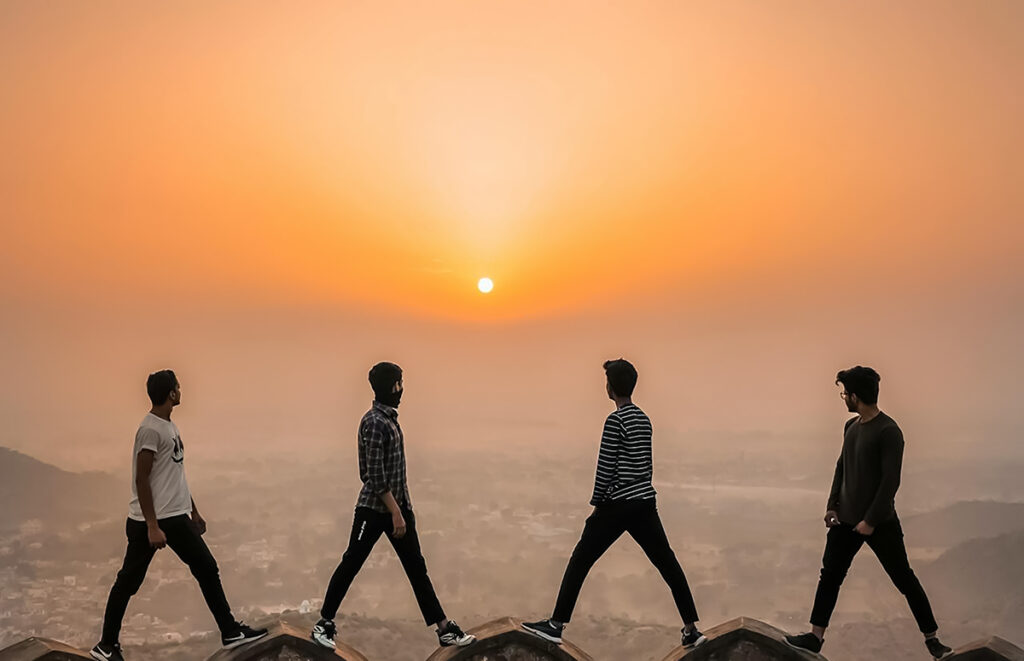Migrants are people who leave their permanent place of residence to live in another region, state, or country in search of better living, employment, education, or security opportunities. Migration is a common process that has been taking place all over the world, and there are various social, economic, and political reasons behind it. Migrants may include workers, students, refugees, and business migrants.
The history of migration in India dates back to ancient times. Migration of different cultures and people has been a common process in Indian civilization, whether for business purposes, religious reasons, or as a result of wars and invasions. During the British rule, millions of people from India were sent to other countries for wages, which is seen as a major example of migration.
In the present time, both internal and external migration are seen in India. Internal migration takes place in search of employment, especially from rural areas to urban areas, while external migration takes place mainly in search of education and higher paying jobs. In addition, a large part of migrants also consists of people who come to India from different countries, whether for business, education or refuge purposes.
Relationships between migrants and local citizens affect the social fabric of any society. Migrants bring new ideas, culture, and skills, which help in economic and cultural development. However, at times, competition and tension also arise between migrants and local citizens, especially regarding employment and resources.
Tolerance and inclusion become important to improve these relations. If the local community accepts migrants with an open heart, it leads to exchange of diversity in the society and creates a harmonious environment, which proves beneficial for all in the long run.
Social Status of Migrants in India
Social Acceptance of Migrants: Problems and Challenges
Social acceptance of migrants in India is a complex and sensitive issue. Migrants are often considered outsiders in the society where they settle. This is primarily due to their cultural and linguistic differences. The local community often views migrants as competitors for jobs, resources, and social services, which may lead to negative attitudes towards them.
Migrants face a variety of social problems, such as discrimination, social insecurity, and negative perceptions towards them. Access to education, health services, and government schemes may also be limited, especially if they are poor or less educated. In addition, urban migrants often have to live in temporary and unhygienic housing, which affects their quality of life. Thus, lack of social acceptance remains a major challenge for migrants.
Cultural Diversity and Migrants: Social Complexities Arising from Diversity

India is a culturally diverse country, where different languages, religions, and traditions exist. The arrival of migrants into this diversity and their integration into the local society becomes complicated at times. Cultural diversity can be a challenge for migrants as well as local citizens. Migrants bring their culture, traditions and lifestyle with them, which sometimes do not match with the local social structure.
Religious and linguistic differences can also lead to social divisions. Due to this cultural difference, migrants face difficulties in social integration, and sometimes an atmosphere of intolerance is created towards them in the local society. However, when cultural diversity is adopted properly, it proves helpful in enriching society.
Impact of Migrants’ Contribution on Society: Contribution in Economic, Educational, and Cultural Sectors
Migrants make a significant contribution to society, which is clearly visible in the economic, educational, and cultural sectors.
1. Economic Sector
Migrant workers contribute significantly to the economic development of the country. They work in various industries, especially in construction, agriculture, and the service sector, which provides stability to the country’s economy. Urban development is difficult to imagine without the labor of migrant workers. Apart from this, migrants also run many small and medium businesses, which give impetus to the local economy.
2. Educational Sector
- Migrant students also have an impact in the educational sector. They give birth to new talents and ideas by studying in various prestigious educational institutions of the country. Due to international migration, Indian students gain global knowledge, which promotes educational excellence in India.
3. Cultural Sector
- Migrants encourage cultural exchange in the society. They bring with them new traditions, food, art and music, which adds to the cultural diversity of the local society. Thus, migrants play a vital role in enriching various aspects of society.
Overall, the contribution of migrants is extremely important in the development of society. However, challenges of their social acceptance still remain, which can be resolved through inclusive policies and awareness.
Local mindset toward migrants
Common perceptions of migrants: positive and negative aspects
Local mindsets towards migrants have mixed reactions. At times, migrants provide essential resources and labour force to society, which benefits the local economy. In this positive view, migrants are seen as hardworking, skilled, and citizens who contribute to the development of society. Their diverse background and culture lead to the emergence of new ideas and innovations in society.
However, negative perceptions also prevail. Local citizens may feel that migrants are putting an unnecessary burden on their employment, resources, and social services. There is a fear of increased competition due to the arrival of migrants, which may limit access to jobs, education, and health services. At times, they are seen as a cause of social insecurity, especially when their cultural and social values differ greatly from those of the local society. This perception leads to seeing migrants as outsiders and unwanted.
Change in Local Residents’ Attitudes: Key Causes and Impacts
Over time, the attitudes of local citizens towards migrants are changing. Some of the key reasons behind this change are:
1. Economic Contribution
- Recognizing the significant contribution made by migrants to the local economy has led to a change in people’s attitudes. They play a vital role in small businesses as well as large industries, thereby promoting local growth and prosperity.
2. Social Inclusion Efforts
Various social inclusion programs run by the government and civil organizations have also encouraged positive attitudes towards migrants. These initiatives are working towards making migrants an integral part of society and providing them equal opportunities.
3. Urbanization and Globalization
- With the increasing urbanization in big cities and the impact of globalization, people are now looking at diversity and cultural exchange positively. The contribution of migrants in the field of education, technology, and business is making society more tolerant and diverse.
The impact of these changes can be clearly seen in the social structure. Migrants are no longer limited to wages but are also gaining important positions in the fields of business, education, and innovation. With the increasing social acceptance towards them, an environment of harmony and coordination is also developing in society.
Impact of media and politics on the image of migrants
Media and politics have a profound impact on the image of migrants. Media, especially news channels and social media play an important role in conveying the issues related to migrants to the public. If the media presents the contribution of migrants in a positive manner, then the acceptance towards them increases in society. But many times the media gives more publicity to crimes, resource conflicts or other negative incidents related to migrants, which creates a negative image of them.
In politics, the issue of migrants often becomes a part of electoral strategy. Many political parties see migrants as vote banks and formulate policies in their favor or against them. Some parties present migrants as the drivers of economic and social development, while other parties carry out negative campaigns considering them the cause of employment and resource crisis. Due to this, the image of migrants becomes a victim of political polarization.
Thus, both media and politics play an important role in influencing the mindset of society towards migrants. The right approach and positive communication can improve the image of migrants, leading to better acceptance of them in society.
Migration and Indian Politics
Positions of Political Parties on Migration Issues
The issue of migration has been a major political topic in India, and different political parties view it from different perspectives. Political parties usually raise migrant issues based on their economic, social, and cultural conditions.
1. Progressive Parties
- Advocate the rights of migrant workers, students, and refugees. These parties demand better living conditions, employment opportunities, and equal access to social services for migrants. In their view, migrants are considered an important factor in the development of society.
2. Conservative Parties
Their attitude towards migrants is usually more harsh. Such parties consider migrants a threat to local resources and employment and advocate limited policies on migration. They take advantage of anti-migrant sentiments and raise issues of security and resources loudly.
Positions of Political Parties on Migration Issues
The issue of migration has been a major political topic in India, and different political parties view it from different perspectives. Political parties usually raise migrant issues based on their economic, social, and cultural conditions.
1. Progressive Parties
- Advocate the rights of migrant workers, students and refugees. These parties demand better living conditions, employment opportunities, and equal access to social services for migrants. In their view, migrants are considered an important factor in the development of society.
2. Conservative Parties
Their attitude towards migrants is usually more harsh. Such parties consider migrants a threat to local resources and employment and advocate limited policies on migration. They take advantage of anti-migrant sentiments and raise issues of security and resources loudly.
Migrants and vote bank politics: issues and strategies

Migrant vote banks have become an important part of politics, especially in urban and industrial areas. The large number of migrant workers in many states has made them an important political group, which political parties take into account in their policies and electoral strategies.
1. Issues
Employment: Job creation for migrants is a major election issue, especially in states where unemployment rate is high.
Security and rights: The Labour rights of migrant workers, and the availability of safe housing and health services for them are also included in political issues.
Science, education and social services: Political parties talk about providing higher education and better social services to migrants so that they can improve their standard of living.
2. Strategies
Migrant-friendly policies: Some parties promise to increase employment opportunities for migrants, provide affordable housing, and guarantee social security so that they can get migrant votes in elections.
Locals vs. migrants: Some political parties put the competition between local citizens and migrants for resources and employment on their electoral agenda. They promise to make policies in favor of local citizens so that migrants can be controlled.
Political impact of migration at the state level: regional politics and policies
The political impact of migration at the state level can be clearly seen, especially in states where large numbers of migrants come or go.
1. Migrant states
- Such as Maharashtra, Delhi, and Gujarat, where millions of migrants come in search of work. The policies of political parties in these states often focus on the welfare and rights of migrant workers. Since there is a large number of migrants there, parties offer policy reforms to remain in power with their support. For example, policies are made to ensure affordable housing schemes, availability of health services, and security for migrant workers.
2. Migration-affected states
- Large numbers of people from states like Bihar, Uttar Pradesh, Jharkhand, and Odisha go out of the state for employment. The emphasis of political parties in these states is on development schemes and welfare programs for the families of migrants.
- Such as pensions for migrant workers, insurance schemes, and provision of education and health services for their families. To solve the social and economic problems arising from migration, regional governments implement special policies that focus on providing employment and economic security to local citizens.
- Overall, migration has a profound impact on Indian politics. Political parties formulate strategies in their policies recognizing the economic, social, and political importance of migrants. At the state level too, concrete policies are made to solve migration issues so that a balance can be established between migrants and local citizens.
Migrant Policies and Government Initiatives

Migrants’ Rights and Government Policies
The government has made several policy efforts to ensure the rights and protection of migrants in India. Policies made to protect the rights of migrants focus on their working rights, social security, access to health services, and education.
1. Working Rights
- The “Inter-State Migrant Workmen (Regulation of Employment and Conditions of Service) Act, 1979” has been implemented to ensure the rights of labor migrants. This law guarantees facilities such as minimum wages, working conditions, and housing for migrant workers.
2. Social Security
- The government is making efforts to connect migrant workers with social security schemes. Schemes like “Ayushman Bharat” ensure access to health services for migrant workers and their families. Apart from this, pension schemes like “Pradhan Mantri Shram Yogi Maandhan Yojana” also provide financial security to migrant workers in old age.
3. Education and Rights
- Special efforts have been made under the “Samagra Shiksha Abhiyan” to ensure access to education for migrant children. This scheme helps migrant children to connect with the mainstream education system and get proper education.
Major government programs run for the welfare of migrants
The government has implemented many important programs and schemes for the welfare of migrants, which aim to improve the living standards of migrants and provide them with essential services.
1. One Nation, One Ration Card Scheme (ONORC)
This scheme is proving to be extremely beneficial for migrants. Under this, migrant workers can avail subsidized ration under the Public Distribution System (PDS) in any part of the country. This provides food security to migrant workers, no matter which state they are living in.
2. Pradhan Mantri Awas Yojana (Urban/Rural)
This scheme aims to provide affordable and sustainable housing to migrants. Especially migrant workers working in urban areas are being given benefits under this scheme to deal with housing-related problems.
3. Mahatma Gandhi National Rural Employment Guarantee Act (MGNREGA)
- This scheme provides employment guarantees for rural migrant workers. This scheme is also helpful for migrants who are looking for employment after returning to their native place.
4. Health and Wellness Program
- Special health services are being provided under the “National Health Mission” for migrant workers. Apart from this, the government launched special health services and financial assistance programs for migrants during the COVID-19 pandemic, so that they can overcome this crisis.
Possible policy reforms for the future
Some possible policy reforms can be worked on in the future to further improve the lives of migrants and protect their rights. These include:
1. Compilation of migrant data and migrant registration:
- A dedicated national migrant database is needed to accurately assess the number, location and needs of migrants. This will help migrants access targeted policies.
2. Special housing scheme for urban migrants:
- In the future, the government will need more affordable housing schemes for migrant workers, especially in metros and industrial areas where the number of migrants is high. Along with this, it is also necessary to focus on the facility of temporary accommodation and labor hostels.
3. Improve social security schemes:
- More policy reforms will be needed to strengthen social security coverage for migrants. The aim will be to link migrant workers to facilities such as a pension, insurance, and health services so that they can be protected from economic crises in the future.
4. Education and skill development programs:
- Skill development and education programs can be expanded for migrant workers and their children. This will increase the productivity of migrant workers and provide better future opportunities to their children.
5. Holistic policy on migration:
- A holistic migration policy is needed, which focuses on both internal and external migration. This policy will have clear guidelines to ensure the rights, security, social integration and equitable distribution of resources of migrant workers.
These policy reforms and initiatives can bring positive changes in the lives of migrants, and they can be better integrated into the society.
Humiliation and loneliness in the city of dreams

Rahul was born in a small village in Bihar. He had big dreams in his childhood, but the village’s limitations and limited resources repeatedly stopped the flight of his dreams. His parents somehow worked hard and educated him, but a time came when financial constraints dashed all their dreams. There was a shortage of even food at home. Seeing the condition of his family, Rahul decided to go to the city in search of a job.
Delhi became his destination, but the dreams that Rahul had dreamt of gradually faded away. After coming here, he understood how different life in the city is from his village. Initially, he got a job as a laborer in a small factory. Even after working twelve hours a day, his salary was so low that he could not even arrange food for himself properly. While spending nights on the streets of Delhi, he would remember the green fields of his village and think with tears in his eyes, “Is this my future?”
Another big problem with Rahul was his identity. Locals called him an ‘outsider’. Everywhere he was made to feel as if he was not a part of the city. His accent, his clothes, and his identity, all made him feel alienated. Some people refused to give him a job because he was a “Bihari”. They looked at him with suspicion, as if he had come to occupy someone else’s place. Every day Rahul wondered whether he had made a mistake or a right thing by coming to the city.
One day, the factory owner fired Rahul without any reason. When he asked the reason, he was told, “Many like you come here, you will find many workers.” Rahul was heartbroken. The city had become even more alien to him. No work, no shelter. His pocket was empty, and there was no ray of hope left in his heart.
Rahul thought, “Should I go back to my village now?” But the poverty of the village reminded him of his miserable life again. There were tears in his eyes, but the way back seemed closed. For Rahul, Delhi had now become a city of struggle, humiliation and pain, but still he was stuck here for his family, for his dreams.
One day, Rahul got the news that his father was ill, and money was needed for his treatment. He was devastated, but he had nothing to give. His soul was shattered thinking that he was not able to help his own family. Tears were not stopping from Rahul’s eyes, and he felt helpless.
This story is not just of Rahul, but of millions of migrant workers who struggle in the cities every day, fighting for their identity, struggle, and existence. They lose their dreams in the glitz of the city, and in return, they get only pain and neglect.
Rahul is still roaming the streets of Delhi collecting the ashes of his dreams, but he is not alone. Like him, many migrant workers go through this struggle every day, but their suffering and their stories often remain unheard.
Conclusion
In a diverse society like India, it is imperative to establish cordial relations between migrants and local citizens. Rather than seeing migrants as mere outsiders, they should be treated as an integral part of society and their social, economic, and cultural participation should be encouraged. This will not only improve the living conditions of migrants but will also enhance harmony and unity in society.
Coordinated efforts are needed to take migrant issues seriously at the social and political levels. Political parties, local governments, and civil society should jointly implement policies and programs that can protect the rights of migrants and ensure their well-being. Along with this, mutual understanding and harmony can be established by promoting dialogue and cooperation between migrants and local citizens.
It is necessary to promote the mindset of seeing migrants as a resource and an important component of development, rather than seeing them as a problem. The contribution of migrant workers and students to society is extensive and important, and appreciating their contribution will benefit society economically, culturally, and educationally. Recognizing migrants as drivers of prosperity and development will be a positive step towards India’s progress.

